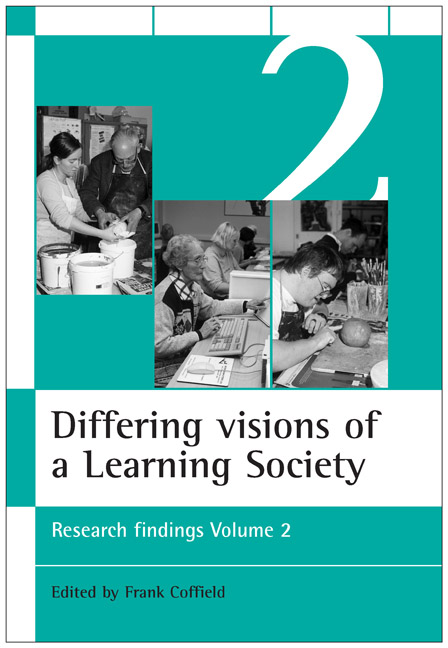Book contents
- Frontmatter
- Contents
- Notes on contributors
- Dedication
- The three stages of lifelong learning: romance, evidence and implementation
- one The meaning of the Learning Society for adults with learning difficulties: bold rhetoric and limited opportunities
- two Networks, norms and trust: explaining patterns of lifelong learning in Scotland and Northern Ireland
- three Learning culture, learning age, learning society: turning aspirations into reality?
- four Teaching and learning in higher education: issues of innovation
- five Participating in the Learning Society: history, place and biography
- six Skills in the British workplace
- Index
- The Learning Society series
two - Networks, norms and trust: explaining patterns of lifelong learning in Scotland and Northern Ireland
Published online by Cambridge University Press: 05 July 2022
- Frontmatter
- Contents
- Notes on contributors
- Dedication
- The three stages of lifelong learning: romance, evidence and implementation
- one The meaning of the Learning Society for adults with learning difficulties: bold rhetoric and limited opportunities
- two Networks, norms and trust: explaining patterns of lifelong learning in Scotland and Northern Ireland
- three Learning culture, learning age, learning society: turning aspirations into reality?
- four Teaching and learning in higher education: issues of innovation
- five Participating in the Learning Society: history, place and biography
- six Skills in the British workplace
- Index
- The Learning Society series
Summary
Background
If we accept the notion of a learning society, it seems logical to conclude that some social arrangements promote learning more than others. It also follows that different social arrangements are likely to promote different types of learning. Most attempts to explore the Learning Society, and identify the different factors which promote lifelong learning, have focused on either the prospects facing individuals (particularly ‘access factors’ associated with entry into learning programmes or the barriers which prevent entry) or on the fate of nations and other large organisations (here, the focus tends to be on policy issues or the impact of external change factors). Our work within the ESRC Learning Society Programme, while accepting the importance of both individual and macro levels, focused on what might be called the meso-level of institutional environments and the belief systems of those who inhabit and shape them. In particular, our work was concerned to find out whether patterns of participation and achievement in organised learning were associated with those intermediate relationships, shared values and habits known to some sociologists as ‘social capital’ (Bourdieu, 1985; Putnam, 1993; Coleman, 1994; Riddell et al, 1999).
This paper draws on a detailed empirical study of schools attainment and adult learning in Northern Ireland and Scotland. At the outset, in 1995, we asked whether there was less adult learning in Scotland and Northern Ireland than elsewhere in the United Kingdom (Field and Schuller, 1995). We noted that there seemed to be strong evidence in both societies of an apparent divergence between very high rates of attainment in initial education on the one hand, and reports of relatively low levels of participation by adults on the other. In what was then the largest UK-wide survey of participation in organised learning, 38% of Scots and 28% in Northern Ireland reported that they had done so in the last three years, compared with 42% in England. There were similar differences in respect of future learning aspirations: 54% in England described themselves as ‘very’ or ‘fairly’ unlikely to take part in the future, compared with 61% in Scotland and 64% in Northern Ireland – these last two being higher than any other parts of the UK (Sargant et al, 1997).
- Type
- Chapter
- Information
- Differing visions of a Learning Society Vol 2Research Findings, pp. 95 - 118Publisher: Bristol University PressPrint publication year: 2000
- 1
- Cited by



